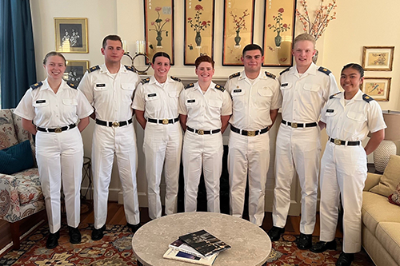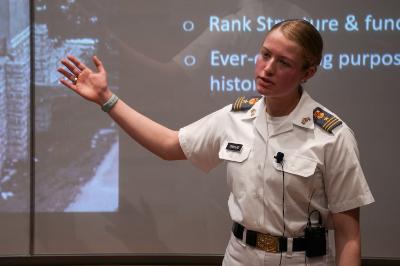Civil and Environmental Engineering
Civil Engineering (CE) is the oldest of the engineering professions, broadest in scope, and parent of all other branches of engineering.
The CE curriculum at VMI includes a traditional array of course that allows cadets to pursue different subdisciplines after graduation. Cadets that successfully complete the curriculum receive an ABET accredited Bachelor of Science Degree in Civil Engineering.
The Civil Engineering program’s educational objectives are to prepare students who, within a few years of graduation, attain:
- Responsible positions as practicing engineers in industry, the military, government, or other fields using their broad-based civil engineering background.
- Additional postsecondary education from graduate schools, work training programs, military service schools, or other areas such as business schools.
- Personal and professional growth by continuing the process of life-long learning.
- Professional engineering licensure with recognition of professional and ethical responsibilities to society and the engineering community.
The CEE program’s student outcomes are taken directly from the seven ABET program outcomes (1) through (7). By fulfilling the curriculum requirements for a B.S. degree in Civil Engineering, the department’s graduates will attain the following:
- An ability to identify, formulate, and solve complex engineering problems by applying principles of engineering, science, and mathematics;
- An ability to apply engineering design to produce solutions that meet specified needs with consideration of public health, safety, and welfare, as well as global, cultural, social, environmental, and economic factors;
- An ability to communicate effectively with a range of audiences;
- An ability to recognize ethical and professional responsibilities in engineering situations and make informed judgments, which must consider the impact of engineering solutions in global, economic, environmental, and societal contexts;
- An ability to function effectively on a team whose members together provide leadership, create a collaborative and inclusive environment, establish goals, plan tasks, and meet objectives;
- An ability to develop and conduct appropriate experimentation, analyze and interpret data, and use engineering judgment to draw conclusions;
- An ability to acquire and apply new knowledge as needed, using appropriate learning strategies.
High School Preparation
Prepare by taking the full college preparatory program augmented by as many math and science courses as your schedule permits. Courses in pre-calculus are particularly important. Engineering drawing (drafting) and computer programming courses are recommended, but they should not be taken in lieu of basic math and science courses.
Accreditation
The Civil Engineering program is accredited by the Engineering Accreditation Commission of ABET, https://www.abet.org, under the commission's General Criteria and the Program Criteria for Civil and Similarly Named Engineering Programs.
Check out some Civil and Environmental Engineering cadets here.
Degrees and Programs
Major(s): Civil Engineering
Degree(s): Bachelor of Science (B.S.)
Sub-disciplines:
Civil Engineering is unique in its offering of sub-disciplines rather than traditional minors. Because of the degree’s broad scope, cadets are required to take courses in all sub-discipline areas.
- Construction Management
- Environmental Engineering
- Fluid Mechanics & Hydraulic Engineering
- Geotechnical Engineering
- Hydrology & Water Resources Engineering
- Structural Engineering
- Transportation & Planning Engineering
Course Flow Chart
Download our Civil & Environmental Engineering Course Flow Chart for 2024 and 2023 to learn more about required courses, pre-requisites, and elective options within the department.
CEE in the News
Find out more about the department's cadets and faculty in recent VMI news.

Brig. Gen. Robert W. Moreschi honored seven exceptional cadets at VMI who are recipients of the prestigious Peay Merit Scholarship. The scholarship is awarded to cadets who demonstrate exceptional leadership, academic excellence, athletic commitment, and an interest in national service.

Honors Week: Barracks Security At VMI
Annie Townsend '24 blended her interest with history, architecture, and security to form her senior thesis, “A Security Analysis of the Virginia Military Institute’s Barracks through the Lens of Infrastructure," which she presented during Honors Week at Virginia Military Institute.
.svg)
.png)